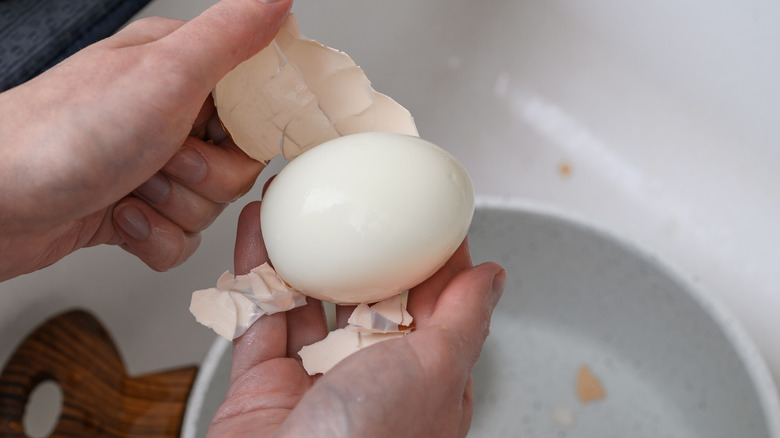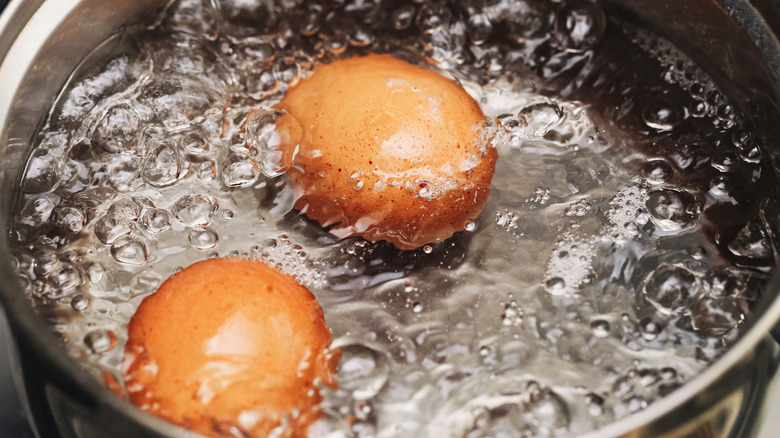The Expert Method For Hard-Boiled Egg Shells That Slip Off With Ease
There seems to be a hack for everything on social media these days, including tricks that people claim can make peeling a hard-boiled egg a breeze. Some people use office tools, like a simple push pin, others make the unexpected choice and tape the egg to contain all the bits of shell, and a few even insist that adding specific ingredients to the water is the solution you've been missing. But do any of these tricks work, or are they just posted for clicks? Well, who better to ask than a chef and the director of innovation at The American Egg Board? Unsurprisingly, Chef Nelson Serrano-Bahri says that all the hacks showcased online aren't really necessary if you use the right kind of egg and focus on perfecting your cooking technique.
One often-repeated rumor is that using eggs of a certain age can make peeling a smoother task. Serrano-Bahri indicates that this is actually true, and explains the science behind it. "As eggs age (typically 7 to 14 days), they lose CO₂ and their pH rises, weakening the bond between the white and inner membrane," he says. "So yes, slightly older eggs do peel easier."
Still, you can't overlook the cooking method, even when using older eggs. "Starting eggs in already-boiling water or steam firms the outer albumen quickly," shares Serrano-Bahri. However, that's only half of the process. "An immediate ice bath afterward helps it contract from the shell," he adds. Once the egg has been cooked correctly, Serrano-Bahri says that there is one trick that can help with peeling: "Crack the shell all over and peel under running or submerged water to float off fragments."
What about extra ingredients for easy-peel eggs?
Of all the existing tips for peeling hard-boiled eggs, perhaps one of the best-known is that adding certain elements to the boiling water makes the shell slip right off. One additive that some folks like to use is oil, perhaps assuming that a little lubrication will make all the difference. However, Chef Nelson Serrano-Bahri says that this concept is mostly a myth. "Oil floats on the surface and doesn't reach the critical interface between the shell and the albumen where sticking occurs," he explains. "At best, it can help prevent shell fragments from clinging when peeling, which can be pleasant, but not game-changing. A teaspoon per quart of water won't hurt, but it won't fix tough-peeling eggs either."
Various other ingredients also don't offer much assistance. "Additives like baking soda or vinegar don't reliably help," says Serrano-Bahri, while also reiterating what does: "Focus on egg age, a hot start, and a cold shock."
Although many of the hacks online aren't that beneficial, they don't necessarily do any harm, either — they're just a waste of time and ingredients. However, Serrano-Bahri notes that there are certain things people should watch out for that can make peeling a hard-boiled egg more difficult. "Overcooking, micro-cracks, or long simmering times can toughen the albumen and worsen sticking," he explains. There isn't really any special trick that makes peeling a hard-boiled egg easier; it just needs to be cooked with care for the best results.

